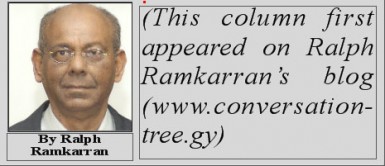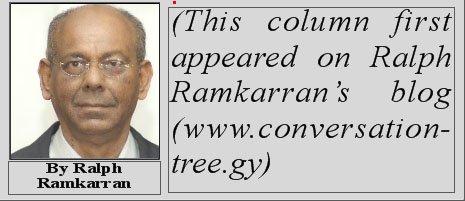 Wracked by dissention and uncertainty, compounded by the dismissal of Vice President Emmerson Mnangagwa, known by the nickname of ‘Crocodile’ which he embraces, the army on Wednesday occupied strategic points in Harare, the capital of Zimbabwe, and deposed President Robert Mugabe, aged 93 and in power for 37 years. The army, led by General Constantino Chiwenga, said that it was not a coup. It appears as if efforts are being made to attain a peaceful and lawful transition of power from Mugabe to a government led by Mnangagwa.
Wracked by dissention and uncertainty, compounded by the dismissal of Vice President Emmerson Mnangagwa, known by the nickname of ‘Crocodile’ which he embraces, the army on Wednesday occupied strategic points in Harare, the capital of Zimbabwe, and deposed President Robert Mugabe, aged 93 and in power for 37 years. The army, led by General Constantino Chiwenga, said that it was not a coup. It appears as if efforts are being made to attain a peaceful and lawful transition of power from Mugabe to a government led by Mnangagwa.
The unfolding events, as they became known, show that Mnangagwa was true to his nickname. In collusion with the army, he was patiently awaiting an opportune moment to move against Mugabe who appeared determined to promote his wife, Grace Mugabe, a deeply unpopular ZANU-PF official, who represents the post-liberation ZANU-PF group, G40, to succeed him. This would have resulted in the sidelining of the army and the veterans. There was open, verbal, warfare between these two distinct sections of the Zimbabwean ruling class. The people of Zimbabwe, downtrodden by poverty, have been unmoved by what is clearly a palace dispute.
Robert Mugabe led Zimbabwe to freedom in 1980 after a liberation war against white minority rule. Leading the five per cent whites in Southern Rhodesia, a British self-governing colony, Ian Smith issued a Unilateral Declaration of Independence in 1965. Britain declined to intervene against what Prime Minister Harold Wilson described as its ‘kith and kin,’ a phrase which has since become famous and used recently in Guyana.
The liberation struggle was led by Mugabe’s Zimbabwe African National Union (ZANU) and Joshua Nkomo’s Zimbabwe African People’s Union (ZAPU). Both leaders had spent 10 years each in Ian Smith’s prisons. The two parties eventually merged after disturbances erupted in Matabeleland, the heartland of the Ndebele people to whom Nkomo belonged. The rebellion was put down with great ferocity, allegedly at a cost of extensive torture and at least 20,000 Ndebele lives. The merger with Mugabe’s Shona dominated ZANU created ZANU-PF and stalled the complete exclusion of the Ndebele from all political influence. ZANU-PF thenceforth ruled Zimbabwe with Mugabe as prime minister from 1980 to 1987 and as president from 1987.
Although a declared Marxist-Leninist, Mugabe pursued market policies. Economic growth was modest but spending on health and education and other social programmes were substantially increased. These resulted in improved conditions for the people of Zimbabwe, but not substantial enough to keep pace with the growth in population.
The government sought to accelerate the land distribution programme in 1990 by passing a law fixing the amount of compensation for land acquired with no appeal. This angered the West and Britain eventually stopped the aid which it had been extending to facilitate the programme. Eventually the land distribution programme became enmeshed in corruption with senior officials becoming beneficiaries. The redistribution programme degenerated into land invasions and was followed by a severe decline in agricultural production.
This harmed Zimbabwe’s economy and resulted in great economic hardships and poverty. Living standards declined considerably, unrest surged, repression was applied and Western sanctions imposed. Mugabe’s reputation suffered. While still revered as a liberation leader in some countries, he was reviled as a dictator among many in Zimbabwe itself and elsewhere. Bishop Desmond Tutu, South Africa’s Nobel Prize Winner, has described Mugabe in unflattering terms and has called repeatedly for is removal.
The mere departure of Robert Mugabe is not going to solve Zimbabwe’s problems. A temporary administration, representative of all major groups in Zimbabwe must replace the ZANU-PF government, with free and fair elections being the first item on the agenda. Human rights must be respected and immediate steps taken to reduce corruption and alleviate living conditions.
Contrary to what ought to happen, reports suggest that Mnangagwe is expected to assume power. In anticipation of succeeding Mugabe after being appointed vice president about two years ago, he appeared to have been making efforts to shed the negative image he has acquired over the decades as Mugabe’s closest associate, being identified with the repression in Matabeleland, the violence against protesters and the rigging of elections. But his assumption of power would only represent the victory of the dominant section of the ZANU-PF ruling class, comprising the army, the bureaucracy and the veterans, not a victory for the Zimbabwean people. If, however, his assumption of office is accompanied by democratic reforms and the dismantling of the current authoritarian and corrupt systems, Mnangagwa, with his already broad support, may well be good for Zimbabwe.
The transformation of liberation movements into governments around the world has not met with universal success. After achieving office many of these movements degenerated into corrupt, or corrupt and oppressive ruling groups. Guyana experienced the growth of an authoritarian state based on rigged elections. The rise in corruption, which continued after democratic restoration and the failure to end the politics of ethno-political dominance have sustained a poisonous political atmosphere and a fragile political stability. All the signs point to these problems continuing to fester for the indefinite future. They will mean the continuation of endless controversy in relation to our social, political and economic development and particularly to the balanced growth of the economy and deployment of our oil resources when they begin to flow.









